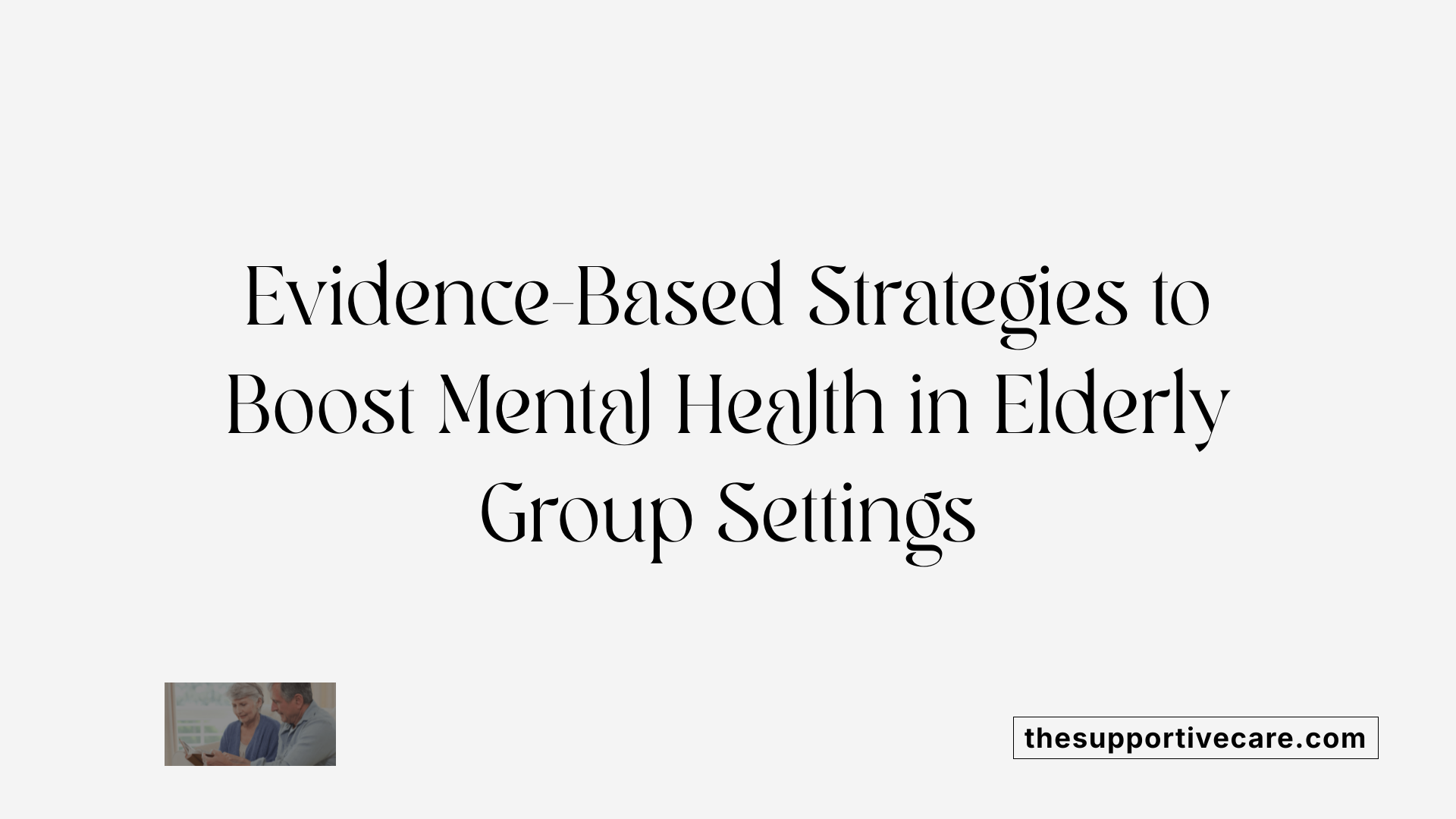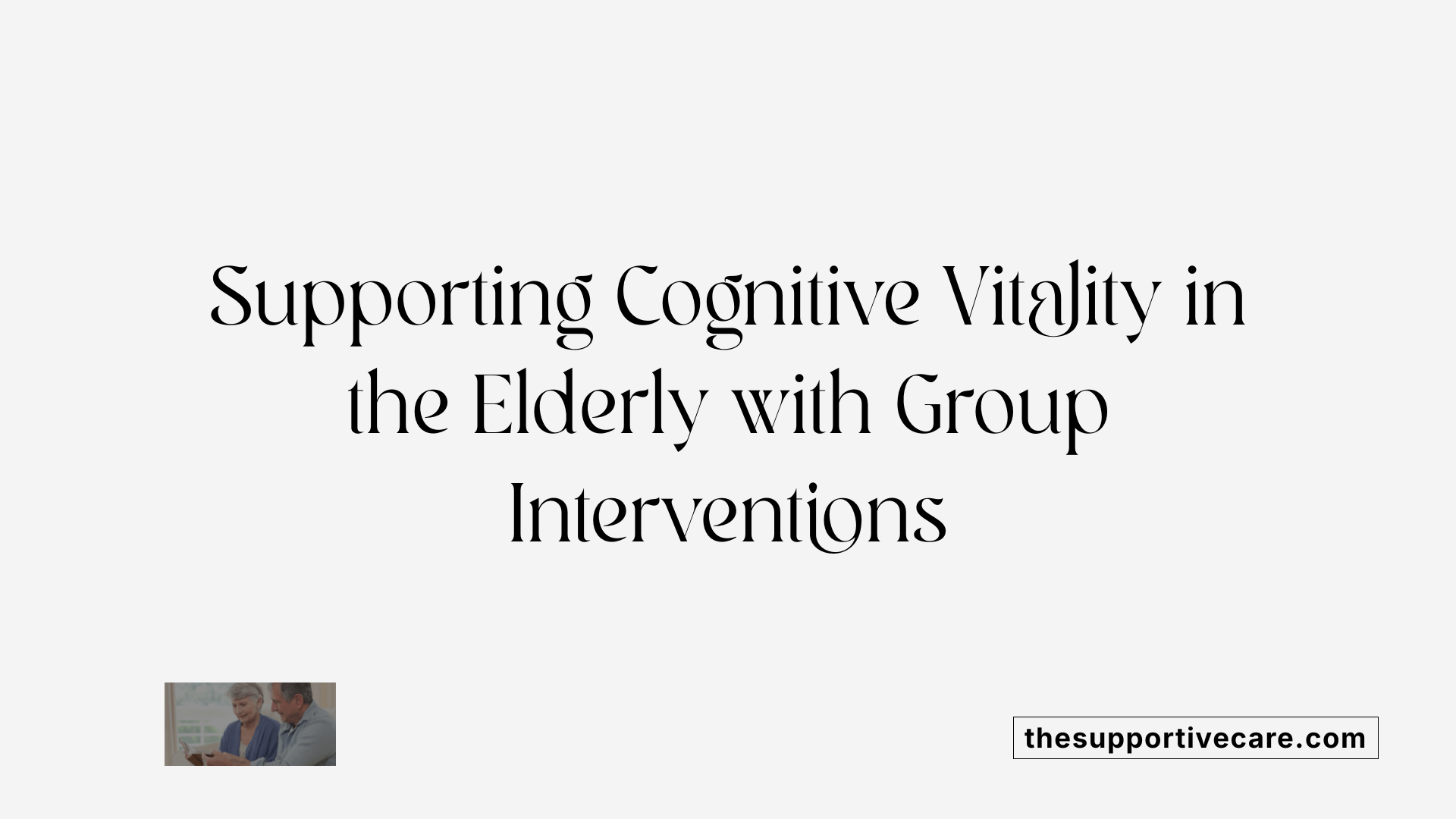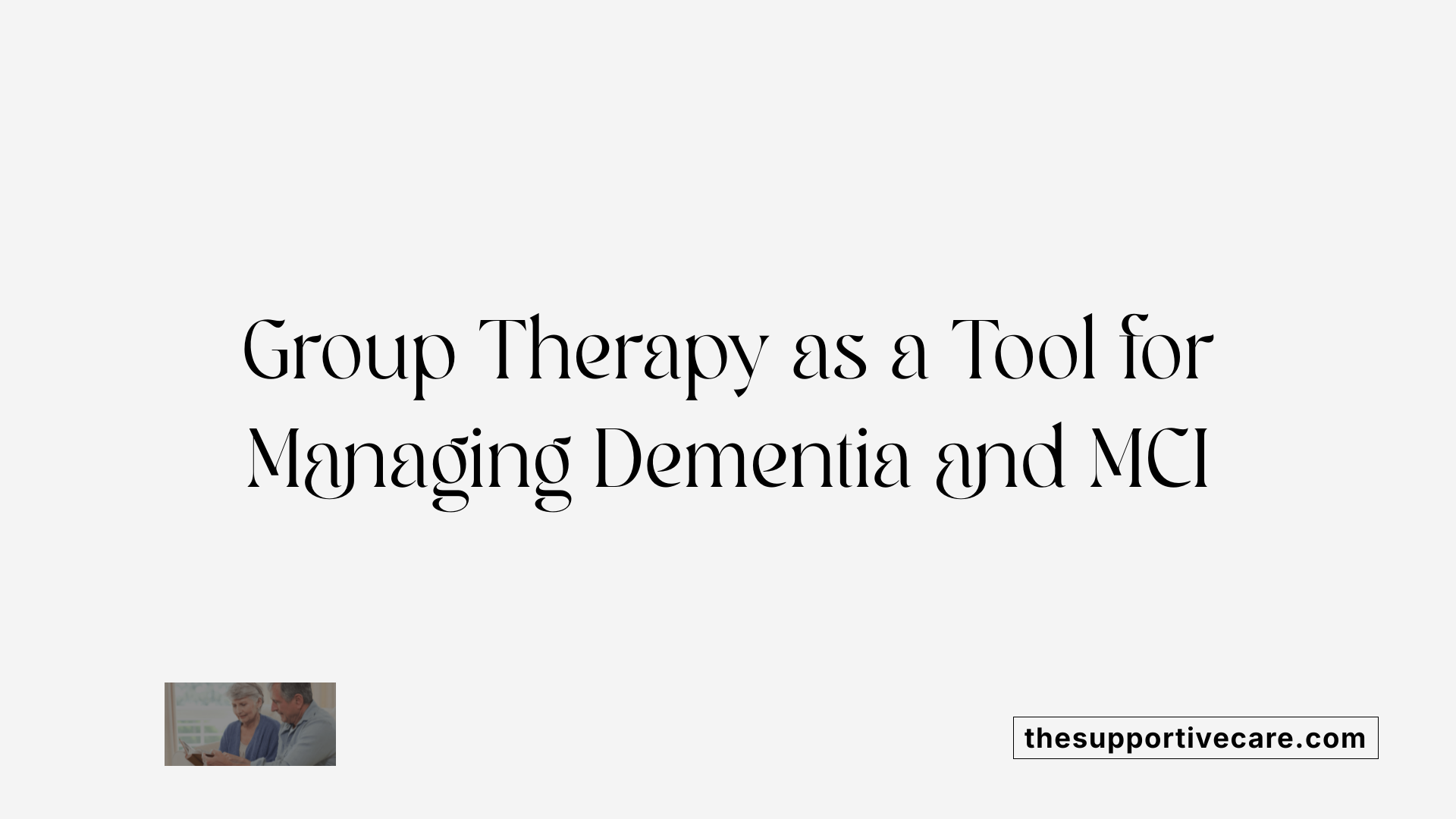Understanding the Power of Group Therapy in Geriatric Care
As populations worldwide age, the need for effective, non-pharmacological interventions to support mental health and cognitive functioning in older adults becomes increasingly urgent. Group therapy modalities, including reminiscence, cognitive-behavioral, art, and music therapies, have emerged as promising approaches. This article explores the impact, methodologies, and scientific evidence supporting these interventions, emphasizing their role in improving mood, enhancing cognitive abilities, and fostering social connectedness among the elderly.
Effects of Group Therapy on Mood in the Elderly

What are the effects of group therapy on mood in elderly populations?
Group therapy plays a significant role in improving mental health and emotional well-being among older adults. Multiple research studies and systematic reviews consistently show that engaging in group interventions can lead to noticeable reductions in depression and anxiety symptoms.
Specifically, therapies such as cognitive-behavioral therapy (CBT), reminiscence therapy, and other psychosocial programs have demonstrated their effectiveness in alleviating depressive states. Participants often report feeling more connected, less lonely, and more hopeful after participating in these sessions.
Reminiscence therapy, which involves sharing personal memories and life experiences, helps elderly individuals process emotions and find meaning, thus reducing distress and improving mood. Psychosocial programs that incorporate structured activities, social interaction, and emotional support further enhance psychological resilience.
Evidence from various types of studies supports these findings. For example, systematic reviews of multiple trials indicate that group therapy can yield significant short-term benefits in reducing depression among elderly populations. Many studies highlight improvements in mood, decreased feelings of loneliness, and better overall psychological health.
However, while the immediate effects of group therapy are well-supported, research on the sustainability of these benefits over long periods remains limited. Further studies are necessary to determine the long-lasting impact and to optimize therapy formats for diverse elderly groups.
| Study Type | Major Findings | Effect Size / Notes |
|---|---|---|
| Systematic reviews | Consistent depression and anxiety reduction | Benefits observed across settings, with short-term improvements |
| Clinical trials (e.g., reminiscence) | Decreased distress, enhanced mental health | Notable reductions in depression scores; improved mood |
| Psychosocial interventions | Improved emotional resilience | Applicable in community and care facility settings |
Group therapy's positive effects on mood highlight its value as a non-invasive, cost-effective approach for enhancing psychological well-being in older adults. These findings support its continued use and further investigation to maximize long-term benefits.
Therapeutic Approaches for Improving Mental Health in the Elderly in Group Settings
 Several evidence-based approaches are recommended for enhancing mental health and cognitive function among elderly individuals in group environments. These include cognitive-behavioral therapy (CBT), reminiscence therapy, art therapy, and music therapy, all adapted to suit seniors' specific needs. For example, reminiscence therapy often involves sharing stories from the past, which can strengthen memory and social bonds, while music therapy can reduce depression and delay cognitive decline.
Several evidence-based approaches are recommended for enhancing mental health and cognitive function among elderly individuals in group environments. These include cognitive-behavioral therapy (CBT), reminiscence therapy, art therapy, and music therapy, all adapted to suit seniors' specific needs. For example, reminiscence therapy often involves sharing stories from the past, which can strengthen memory and social bonds, while music therapy can reduce depression and delay cognitive decline.
Integrating positive psychology principles into these group interventions can also be highly beneficial. Such techniques promote virtues like gratitude, hope, humility, and resilience, fostering holistic well-being. These virtues not only improve mental health but also contribute to personal growth and resilience against stress.
Group therapy offers many advantages, such as decreasing feelings of loneliness, increasing social connectedness, and improving emotional regulation. Activities like group singing, collaborative art projects, or cooking sessions help build a sense of community and purpose, which are vital for older adults.
Effective implementation often requires a multidisciplinary approach. This includes thorough assessment, collaborative treatment planning, and cultural adaptations to ensure that interventions are relevant and respectful of diverse backgrounds. Platforms for delivery might include community centers, senior clubs, or telehealth services to broaden access.
Creating a warm, supportive environment with trained facilitators helps participants feel safe to express their feelings, process their experiences, and develop adaptive coping strategies. Such environments help improve both mental health and cognitive functioning by fostering trust, engagement, and active participation.
In summary, combining evidence-based therapies with positive psychology and cultural considerations enhances their effectiveness. Group settings not only target psychological symptoms but also nurture virtues and social bonds that underpin long-term well-being.
Impact of Group Therapy on Cognitive Function

How does group therapy impact cognitive function in older adults?
Group therapy has demonstrated significant positive effects on cognitive abilities in elderly populations, especially among those with mild cognitive impairments or early stages of dementia. Activities such as cooking, physical exercises, and music therapy are examples of experience-based interventions that have been linked to improvements in mental functions.
In studies involving older adults with mild dementia, participants showed notable increases in Mini Mental State Examination-Korean (MMSE-K) scores after the therapy sessions. These sessions typically lasted 2 hours weekly over a period of 10 weeks, combining warm-up, active engagement in the activities, and cool-down periods. Results indicated enhancements in memory, attention, language, and executive functions.
Beyond cognitive measures, group therapy also fosters improvements in physical health, mood, and overall quality of life. For example, physical activities like Tai Chi or tailored exercise programs help maintain mobility and physical resilience, which in turn support cognitive health.
Structured activities, including music sessions and reminiscence therapy, activate neural networks associated with memory and emotional regulation. Active participation in such activities, especially musical engagement, has been associated with delayed cognitive decline and reduced neuropsychiatric symptoms. These therapies often produce long-lasting benefits, encouraging continued mental and physical engagement.
Overall, group therapy is an effective, holistic approach that not only targets cognitive function but also enhances psychological and physical well-being. Its multidisciplinary nature makes it a promising strategy for supporting healthy aging and managing early dementia in elderly populations.
| Type of Activities | Cognitive Benefits | Additional Benefits | Notes |
|---|---|---|---|
| Cooking & Physical Exercises | Improved attention, memory, executive functions | Physical health, mood elevation | Conducted weekly for about 10 weeks |
| Music & Reminiscence Therapy | Memory recall, language, emotional regulation | Mood stabilization, social interaction | Shows long-term effects in studies |
| Structured group activities | Enhanced engagement and mental resilience | Improved quality of life | Benefits observed across various cognitive levels |
These findings collectively highlight that well-structured group therapy programs serve as valuable tools in promoting cognitive health among the elderly, emphasizing a comprehensive approach to aging with dignity and functional independence.
Scientific Evidence Supporting Group Therapy Efficacy
 Numerous scientific investigations underpin the positive impact of group therapy on elderly individuals facing cognitive and emotional challenges. Systematic reviews and meta-analyses examining various modalities—such as reminiscence therapy and cognitive-behavioral therapy (CBT)—consistently demonstrate that these interventions can produce meaningful improvements.
Numerous scientific investigations underpin the positive impact of group therapy on elderly individuals facing cognitive and emotional challenges. Systematic reviews and meta-analyses examining various modalities—such as reminiscence therapy and cognitive-behavioral therapy (CBT)—consistently demonstrate that these interventions can produce meaningful improvements.
A comprehensive review analyzing nine studies on geriatric depression highlighted that group therapy can significantly reduce depressive symptoms, with moderate effect sizes around 0.42. Similarly, multiple randomized controlled trials focusing on cognitive decline, mild cognitive impairment (MCI), and dementia show enhancements in cognition, particularly in areas like memory and attention. For example, music therapy and personalized cognitive stimulation programs have been associated with sustained cognitive improvements, especially in participants with milder impairments.
The impact of these therapies extends beyond cognition, with notable benefits in psychological well-being, including reductions in anxiety and depression. Meta-analyses reveal that these effects are consistent across geographic regions, cultural contexts, and different healthcare settings. Among individual therapies, reminiscence therapy and CBT stand out for their effectiveness in promoting engagement, mood stabilization, and social connectedness.
While the evidence supports the overall usefulness of group therapy, some limitations remain. Many studies feature small sample sizes, short intervention durations, and diverse methodologies, which can affect the generalizability of findings. Despite these constraints, the accumulated data point toward the value of group therapy as an accessible, non-invasive, and cost-effective approach to improving quality of life in aging populations.
In conclusion, current research affirms that group therapy, particularly tailored and interactive interventions, holds substantial promise for addressing the complex needs of older adults with cognitive and emotional vulnerabilities. Continuing studies will help refine these approaches and establish more definitive guidelines for widespread application.
Effectiveness of Group Therapy for Dementia and Mild Cognitive Impairment
 Group therapy offers a promising approach to improve the quality of life for elderly individuals with dementia or mild cognitive impairment (MCI). It promotes social bonding, enhances self-efficacy, and fosters acceptance of the condition, which are crucial for psychological well-being.
Group therapy offers a promising approach to improve the quality of life for elderly individuals with dementia or mild cognitive impairment (MCI). It promotes social bonding, enhances self-efficacy, and fosters acceptance of the condition, which are crucial for psychological well-being.
Numerous recent studies highlight the benefits of experience-based activities, such as cooking and physical exercises, in group settings. One notable study involved 12 older adults with mild dementia, averaging 76.75 years old, engaging in weekly two-hour sessions over ten weeks. These activities led to significant improvements in cognitive functions (measured by MMSE-K), physical health (via GPT), and quality of life (using GQOL-D). Additionally, depression levels decreased markedly, indicating the positive psychological impact of these activities.
Systematic reviews and meta-analyses further support these findings, showing that group interventions—ranging from reminiscence and cognitive-behavioral therapy to music and art therapy—can significantly enhance mental health. For instance, a review of nine studies concluded that group psychotherapy effectively reduces depressive symptoms and improves mood, social engagement, and cognitive functions.
Moreover, participation in group activities encourages social participation, helping individuals cope with their diagnosis and reducing feelings of loneliness. These activities contribute to increased self-esteem and foster a sense of community, which are vital for emotional resilience.
| Study Focus | Intervention Type | Outcomes | Sample Size | Duration | Key Benefits |
|---|---|---|---|---|---|
| Elderly with mild dementia | Experience-based group activities (cooking, physical activity) | Cognitive, physical, psychological improvements | 12 participants | 10 weeks | Improved MMSE-K, GPT, GQOL-D; reduced depression |
| Systematic review | Various group therapies including reminiscence and CBT | Mood, self-esteem, social participation | 9 studies | Varies | Decreased depression, improved engagement |
| Dementia with music therapy | Group music therapy sessions | Depression, cognitive function | 104 participants | 6 weeks | Reduced depression, delayed cognitive decline |
In summary, current evidence indicates that group therapy—particularly when activity-based—can effectively support elderly individuals with dementia or MCI. While the results are encouraging, many studies face limitations such as small sample sizes and diverse intervention methods. Consequently, more large-scale, standardized trials are needed to strengthen the evidence base and optimize therapy strategies.
Search query for further information: effectivenes of group therapy for dementia and MCI
Long-term Benefits and Challenges of Group Therapy
Research into group therapy for elderly individuals shows promising results over the long term. Multiple studies have reported sustained improvements in cognitive functions, such as memory and orientation, as well as psychological health, including reductions in depression and anxiety.
For example, interventions like reminiscence therapy and cognitive stimulation have demonstrated not only immediate benefits but also long-lasting effects that persist for several months after the completion of therapy. In one comprehensive study, participants with mild dementia experienced improved overall cognition and mood even one year post-intervention, highlighting the potential for lasting impact.
Despite these positive findings, current research faces several limitations. Many studies involve small sample sizes, limiting the generalizability of the results. The diversity in study designs, intervention types, and assessment tools also complicates direct comparisons and conclusions.
Moreover, most research has been conducted over relatively short periods, with fewer studies focusing on the sustainability of benefits over multiple years. The long-term efficacy of group therapy, particularly in varying community and clinical settings, remains underexplored.
To truly understand and optimize the use of group therapy in elderly populations, larger-scale and standardized trials are necessary. These should ideally include diverse participant groups, extended follow-up periods, and consistent outcome measures to better assess the durability of therapeutic gains.
Overall, while current evidence supports the effectiveness of group therapy to produce enduring improvements in cognition and mood among elderly individuals, more comprehensive research is essential to address existing gaps and establish best practices for sustained mental health support in aging populations.
| Aspect | Findings | Limitations |
|---|---|---|
| Cognitive benefits | Improved memory, orientation, and executive functions lasting beyond therapy | Small sample sizes, short follow-up periods |
| Psychological improvements | Reduced depression and anxiety, sustained over several months | Variability in therapy protocols |
| Physical health | Enhanced engagement in activities and physical well-being | Need for more long-term, large-scale studies |
| Overall sustainability | Evidence suggests enduring effects, but confirmation in broader contexts is needed | Lack of standardization and diverse participant demographics |
Concluding Remarks on the Role of Group Therapy in Elderly Care
Group therapy offers notable advantages for the mental and physical well-being of older adults, especially those facing cognitive challenges like dementia or mild cognitive impairment (MCI). Multiple studies highlight that such interventions can significantly improve mood, cognitive functions, and overall quality of life. For instance, activities like cooking, physical exercises, music therapy, and reminiscence groups have demonstrated benefits in enhancing engagement, reducing depression, and maintaining cognitive skills over extended periods.
Research consistently shows that participation in structured group activities fosters social connectedness and self-efficacy. These social bonds are crucial for emotional resilience and can delay the progression of neuropsychiatric symptoms. Evidence from diverse protocols indicates that even brief, targeted interventions—such as fewer than 14 sessions—may produce meaningful improvements.
However, despite these promising findings, the current body of research has limitations. Many studies involve small sample sizes, may lack long-term follow-up, and exhibit variability in intervention types. To establish firm guidelines and optimize outcomes, further large-scale and multisite studies are essential. Such research can help identify the most effective activity types, durations, and frequencies tailored to different stages of cognitive impairment.
Practicing healthcare providers should consider integrating group therapies into regular care plans, emphasizing activities that promote engagement and joy. Continued research and innovation are needed to refine these approaches, ensuring they meet the diverse needs of the elderly population and foster healthier, more fulfilling aging experiences.
Harnessing the Therapeutic Potential of Group Interventions in Aging
In sum, the accumulated evidence underscores the significant positive impact of various group therapies on mood and cognitive health in elderly populations. From reducing depressive symptoms to enhancing memory and overall quality of life, structured group activities like reminiscence, music, art, and cognitive stimulation are invaluable tools in geriatric mental health care. While current research demonstrates promising short-term and some sustained benefits, there remains a pressing need for larger, standardized, long-term studies to better understand and optimize these interventions. Integrating these therapies within multidisciplinary, culturally sensitive frameworks, and leveraging community or digital platforms, can further improve accessibility and effectiveness. Ultimately, fostering emotional resilience, social bonds, and cognitive vitality through group therapy can significantly enrich the lives of aging individuals, reaffirming its vital role in comprehensive elderly care.
References
- Effects of experience-based group therapy on cognitive ...
- The impact of group activities and their content on persons ...
- Efficacy of group psychotherapy for geriatric depression
- Effects of cognitive stimulation program on ...
- The Impact of Group Music Therapy on Depression and ...
- The effect of music therapy on cognitive functions in patients ...
- The effect of receptive music therapy on older adults with ...



































































































